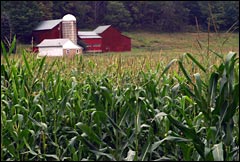
Cultivating change?
Photo: iStockphoto
Like his father, grandfather, and great-grandfather before him, Brian Miles spends his days working the family farm. Unlike his forebears, however, he also sits on the board of Mid-Missouri Energy, a farmer-owned ethanol cooperative in Malta Bend, Mo. Grist talked to Miles about the present ethanol boom, the potential for an ethanol bust, and the many splendors of fresh corn on the cob.
How did you get involved in the ethanol biz?
Our state corn growers association had a meeting a few years ago, because they had isolated this area as a good spot for an ethanol plant. The economics were a little different back then than they are now. It wasn’t as tried and true. There were probably 250 people that showed up. Anybody that was interested in helping to get the thing going and put in a time commitment could sign a sheet. We were crazy enough to volunteer.
Why was starting an ethanol cooperative important to you?
There are a lot of articles that say, oh, ethanol will never work; it will never be the solution. Well, they’re right. It’s never going to be 100 percent of the solution. But it’s certainly a piece of the puzzle. And if we get enough of those kinds of pieces, then maybe we won’t have as many people blowing us up. [Laughs.]
The core reason most of us volunteered to do it is to help the price of corn locally and internationally. And the second reason is that our community of 13,000 has probably been around 13,000 for the past 30 to 40 years. We knew that we needed economic development. We’re just far enough away from Kansas City, and St. Louis, and even Columbia that it’s tough to commute. We knew this would provide at least 34 jobs early on — and really good paying jobs, with good insurance and good benefits for families.
It seems like everyone is jumping on the ethanol bandwagon right now. I know other companies have approached Mid-Missouri about buying you out. What do you think is the future of Mid-Missouri?
[The head of Mid-Missouri’s board] jokes that sometimes it’s harder to manage prosperity than the other way around. It’s been a great run. Now that things have started, we’re a little concerned that the industry could be overbuilt. But there’s also a possibility that demand can keep up with supply. I guess $3 [per gallon] fuel taught us one thing, myself included: we’re probably not going to slow down our lifestyle by that much, at least at that price.
What has the ethanol plant meant for the average farmer or investor?
It’s really been nice. We really don’t hear any negative comments. The return on investment has been a huge bonus. That’s been a really nice surprise, how high it’s been. But it’s been a great market. No matter what people say, we have a lot of corn out here in the country and we’ve needed a place to turn it into something good.
There have been some studies that ethanol takes more energy to produce than it supplies. What’s your take? What do you use to power your plant?
What we use to power our plant is electricity and natural gas. As far as the net energy gain, the reason they love that, is that it’s good press. There’s a 30 to 40 percent gain there, and it’s continuing to get better at a steady rate.
Are you taking any measures to make your plant more efficient? Any new technology?
A lot of plant managers talk to other plant managers. It’s not a them-versus-us scenario. A lot of these technologies are really new, and a lot of them I can’t even discuss because there’s a confidentiality clause.
So what kind of car do you drive?
We have a pickup that’s E85 [compatible]. My wife drives — if you can believe it — a foreign vehicle. We burn the 10 percent in there. [Editor’s note: See “Can My Car Do That?“]
All right, I’ve got to ask: What’s your favorite corn dish?
This will be a strange answer, but my honest-to-gosh favorite is corn on the cob — but that’s only at certain times of the year. Beyond that, one way that I really do like corn is in chicken pot pies. My wife and my sister make it. We like to really lay on the sweet corn in there. And that’s probably my favorite.
